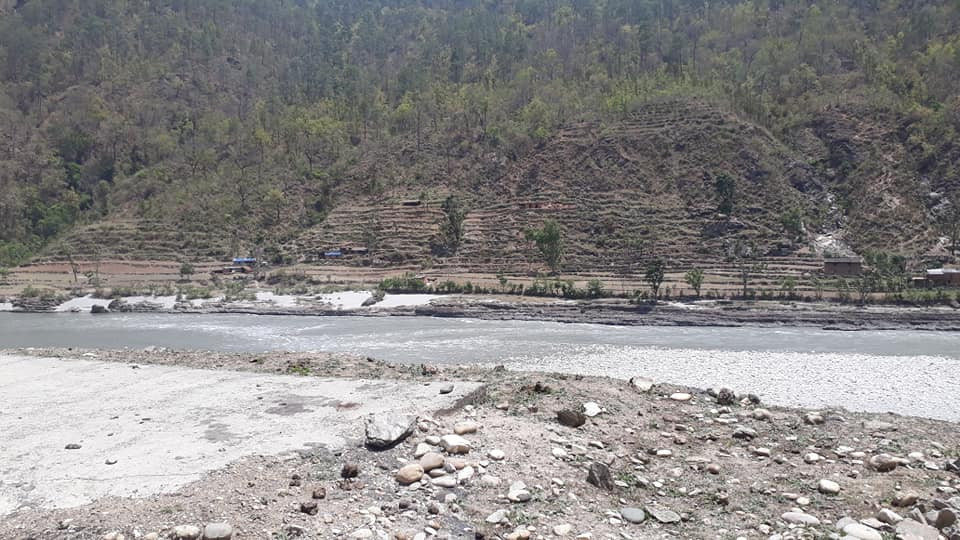Many of us in Nepal might have played Chhoi Dom, a kind of chasing game, while growing up. The game typically involves the contest between a particular player chosen as a Dom and the rest of the players who have to run away from the Dom. Should the Dom succeed in touching others, the role is passed onto the latter and the game goes on.
When Navaraj BK went to his girlfriend’s home in Soti of Chaurjahari municipality, Rukum on May 23, the girlfriend's mother reportedly fumed, “Ta Dom Feri Aais?”, meaning “Dom, how dare you come again?” It was, for many of us, a baffling proclamation on the mother’s part. The inner meanings of our beloved game finally came to us. The Dom, they say, exists at the bottom of caste and Varna charts. The Dom dare not marry an “upper caste” girl.
The tragedy that was to follow later on the day in the banks of Bheri has, once again, brought the Nepali society’s deep-rooted casteism to the fore. Navaraj, 21, and his five friends lost their lives after being attacked by the village mob, allegedly incited by the girl’s family and the ward chair. Her parents had been rejecting the duo’s long-standing love affair and mutual desire to marry on caste grounds. She was a Thakuri; Navaraj, a Dalit, a Dom. She, at 17, however was three years short of the minimum age for marriage without consent of guardians as required by the law.
While violence and even murders surrounding inter-caste marriage issues are not uncommon in the “socialism-oriented” republic, the Rukum incident is, by far, the most tragic event of the kind. The slaying comes at a time when the Communist Party of Nepal, which includes the Maoists that waged a decade-long rebellion starting from the district to end all kinds of discrimination, enjoys a significant majority in the parliament. The incident is a slap in the face of their “revolution” for social equality, and Dalit empowerment. As for us, who have played Chhoi Dom and ran away from the Dom, it is a proof of how casteism and untouchability sneaks even into our childhood innocence. These games are not merely vestiges but a microcosm of our centuries old, and yet strong, Varna-caste consciousness.
The 2015 Constitution prohibits caste-based discrimination of any kind and guarantees political representation of Dalits. The election law requires one Dalit member in every ward of local bodies. While rights activists argue that these measures are not enough in themselves, these incidents raises concerns if these present measures have, in any way, been effective at all. To ensure that constitutional reforms addressing casteism bear fruits, political parties have to make sure the Dalit representatives they choose are not just to make the numbers, but the torchbearers of this project. To bring back the trust, impartiality, and competence in the local bodies, political parties ought to focus on their schooling and ethos to defeat social evils.
The arrest of ward chair Dambar Bahadur Malla for his alleged role in perpetrating the crime has once again raised questions about the political parties’ choice for local representatives who have time and again failed in their roles. Early in March 2018, Mamata Prasad Chaudhary, Mayor of Ghodaghodi municipality, was accused of helping those charged of beating 18-year-old Radha Chaudhary accusing her of witchcraft escape punitive measures. Although influence, experience, and connections trump meritocracy in intra-party politics, it is evident that political parties, particularly the ruling party, are slowly failing to bring forward the principled leaders who can give society a direction.
Much of the onus lies in the ruling party which in the past championed the Dalit cause in the region. Despite the party enjoying significant political majority in the local, provincial, and federal units, mob-lynching under an elected representative of the same party is a testimony to the Kathmandu-based party leadership’s wavering dedication toward social equality and justice.
The Chaurjahari incident has also proven that judicial provisions and democratic values are simply not enough to extirpate centuries-old caste structures that pervade the country. The state can intervene and punish the wrongdoers but the social consciousness is something that has to be uniquely local and natural. French political philosopher Alexis de Toquevilee wrote, while democracies declare everyone as free and equal and we are tempted to rely on the state and its power for guaranteeing us what we are owed, but in that process, we lose our mutual ties, connections, and necessary conversations which are far more potent for solving social problems. The changes cannot be top-down; they have to be bottom-up such that every member in the society understands the gravity of the problem.
But contrary to what Tocqueville says, our society is far from establishing a connection that includes all its members. The struggles of Dalits to fit in this hierarchical society has always been characterized by cruelty, inhuman experiences and prejudice. Despite all the political and judicial progress in the country, the so-called upper caste does not seem to be ready to accept the Dalits as equals. Legislations alone cannot assure that Chaurjahari incident will be the last of its kind as society continues to exercise exclusion and discrimination against the Dalits.
(Pant is an undergraduate student in Georgetown University Qatar and Bhandari in Kenyon College, Gambier, USA)

